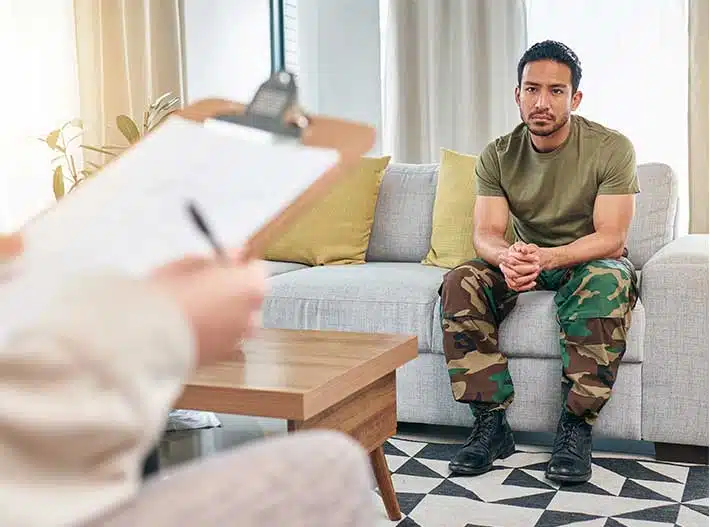10 Challenges Veterans Face When Returning To Civilian Life
- Mental Health Problems
- Homelessness
- Unemployment
- Reconnecting With Family & Friends
- Physical Handicaps
- Health Insurance
- Sense Of Purpose
- New Location
- Routine
- Finding Help

New veterans face various challenges when returning to civilian life. After leaving the battlefield, adjusting to day-to-day life can prove difficult for some, according to the U.S. Department of Veteran Affairs (VA).
1. Mental Health Problems
While on active-duty, military service members may experience or witness traumatic events. This can lead to mental health problems.
Combat veterans may face mental health challenges due to the stressors caused by military service. One of the frequent mental health disorders a vet may suffer from is post-traumatic stress disorder (PTSD).
To support veterans, mental health treatment is offered by the VA.
2. Homelessness
Homelessness is a major issue military veterans experience. In fact, homeless veterans face similar difficulties as non-veterans who are homeless.
Vets who are homeless may struggle with mental health issues, unemployment, and substance abuse.
3. Unemployment
The job search can be difficult for vets, but the VA may assist you. Those who joined the military without any work experience may struggle to find a civilian job they are suited for.
This can prove to be even more difficult when a person is struggling with mental health issues. Entering the civilian world and adjusting slowly can be beneficial.
4. Reconnecting With Family & Friends
Military life involves a sense of camaraderie among other military personnel. When in threatening situations, soldiers can come together to support one another.
Once this type of military experience ends, new army vets may feel isolated and alone without their comrades. Forming friendships may seem difficult, but reconnecting with your loved ones can be beneficial to your social life and mental health.
Those who served in Iraq or Afghanistan and often had multiple deployments created disrupted connections with family. Confiding in family members and spending time with them once home can help you become reacquainted and maintain relationships.
5. Physical Handicaps
Those who served in the armed forces returning from war may experience physical health challenges as well. Toxic exposure, improvised explosive devices (IEDs), and other illnesses may affect those on the battlefield.
Some may suffer from traumatic brain injuries (TBIs), creating the need for disability. TBI can result in headaches and fatigue. Others may suffer loss of limbs from explosions requiring the use of a wheelchair or prosthetic leg.
6. Using Health Insurance For Treatment
Thankfully, there are VA benefits offered to those seeking health insurance for treatment of physical disabilities as well as mental health issues. Additionally, the VA can help find treatment options for those suffering from a substance use disorder (SUD).
Speak with your local VA to learn more about your health benefits. You can also receive assistance for addiction treatment by utilizing Medicaid, Medicare, or Tricare if eligible.
Although it’s a good thing veterans have insurance available, it can be a cumbersome and challenging process to receive benefits for behavioral health care.
7. Discovering A Renewed Sense Of Purpose
Having a renewed sense of purpose once you come home can provide hope and positivity. By taking part in a hobby once enjoyed, you can begin to transition back to civilian life.
Although it may be difficult, a veterans transition may be made easier by partaking in an activity you enjoyed before entering the military.
Whether you pick up a paint brush or enjoy a game of sports with friends, finding a purpose and surrounding yourself with loved ones can help you center yourself and improve symptoms of mental illness for those suffering.
8. Adjusting To A New Location
When returning home, there may be several differences including the potential for new neighbors. If you are living in a new apartment or home, it may take time to get accustomed to the nearby noises.
Take this time to meet your neighbors and become aware of your surroundings so you can feel more comfortable in your living space.
9. Establishing A Routine
Part of the difficulty in the readjustment to daily life for vets is finding a routine. After months or years in the military experiencing long hours, a lack of sleep, and traveling from one place to another, returning to civilian life can prove to be a difficult transition.
Those who are able to find a job may also find consistency with a helpful schedule. Your daily routine may include working at a job, scheduling an activity you enjoy, and participating in treatment options such as therapy.
10. Finding Help
Your well-being is of the utmost importance. Receiving the medical care you require upon returning from the military is crucial to successfully transitioning to civilian life. Those struggling with mental health issues or a SUD may require immediate treatment.
Additionally, the VA offers a transition assistance program (TAP) which provides resources and tools for vets and their loved ones.
If you are struggling, consider finding treatment at Ark Behavioral Health. At our treatment centers, we provide numerous healthcare services for you to consider such as therapy options, detox, and inpatient and outpatient care. Contact us today to learn more.
Written by Ark Behavioral Health Editorial Team
©2024 Ark National Holdings, LLC. | All Rights Reserved.
This page does not provide medical advice.
Questions About Treatment?
Ark Behavioral Health offers 100% confidential substance abuse assessment and treatment placement tailored to your individual needs. Achieve long-term recovery.
100% confidential. We respect your privacy.
Prefer Texting?
Our friendly support team is here to chat 24/7. Opt out any time.







 Learn More
Learn More








